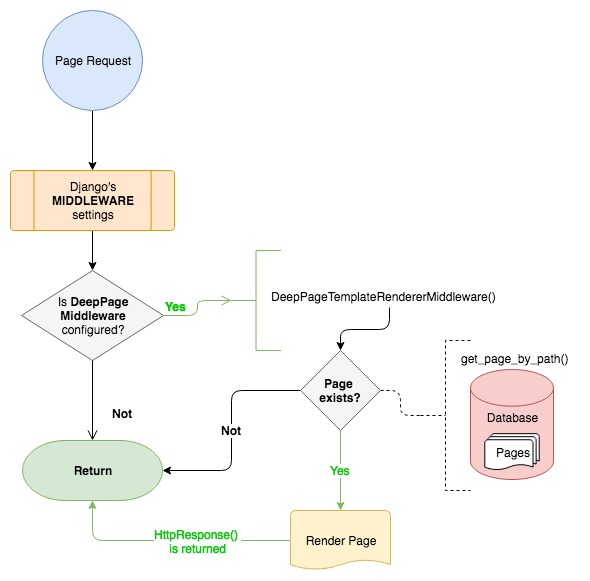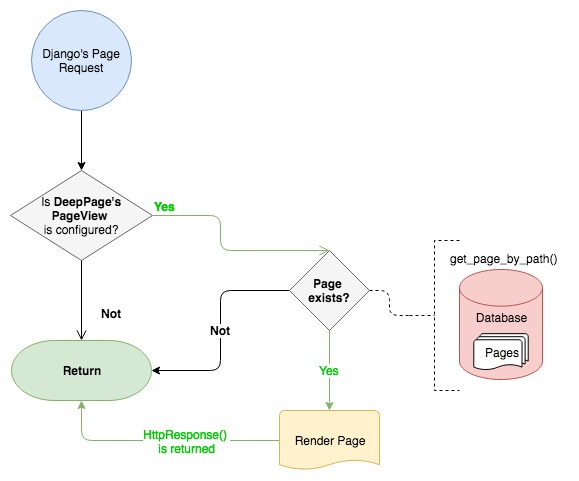Django's database stored web content processor
Project description
deep-pages
Django's database stored web content processor
About
My motivation to create this small package raises when I was needing to create some small pages with static URL and want to use some template tags. So, unfortunatelly Django's Flat Pages wasn't enough in my case.
Ok, so what the DeepPages does? With DeepPages you can store a page (or any other text-based content) into your database using the Page Model, set a static URL to that and get it rendered. Simple.
How it works?
DeepPages provides two ways to being used into your Django's project:
1. As Middleware
All you need is add DeepPageTemplateRendererMiddleware as a middleware in your settings. I really do recommend to insert this middleware in the end of MIDDLEWARE's list.
2. As PageView (TemplateView's inheritance)
Actually it was the first way that I've created. You need to include DeepPage's url patterns into your project (see Install).
Signals
DeepPages has three signals that you can connect to workaround. You can import those from signals.py.
They are: page_requested, page_found and page_not_found.
from django.dispatch import receiver
from deeppages.signals import page_requested, page_found, page_not_found
@receiver(page_requested)
def page_requested_callback(sender, path, request):
# do something here
pass
@receiver(page_not_found)
def page_not_found_callback(sender, path, request):
# do something here
pass
@receiver(page_found)
def page_found_callback(sender, path, request, page, content, context):
# do something here
In page_found signal's receiver you can change the arguments content and context to get rendered by Middleware or PageView (depending how you've configured in your project).
Programmatically DeepPages Rendering
You can get a DeepPage rendered programmatically. To do this you just need to import get_page_by_name function from utils.py.
Function statement:
def get_page_by_name(name, context=None, callback=None)
Where:
- name = Page name
- context (optional) = A dictionary with context for template processing
- callback (optional) = A function to be called with arguments
pageandcontextbefore rendering and should return the new page content.
So, assuming that you've created a page named as test-page, do it:
from deeppages.utils import get_page_by_name
def render():
rendered_page = get_page_by_name('test-page', ctx)
# do something
Install
pip install deeppages
After package install, add deeppages in your INSTALLED_APPS list.
INSTALLED_APPS = [
...
'deeppages.apps.DeepPagesConfig',
...
]
If you want to use the Middleware way (personally, it's my preferred btw), open your settings file and look for MIDDLEWARE list.
MIDDLEWARE = [
...
'deeppages.middleware.DeepPageTemplateRendererMiddleware',
]
Or, if you want to use the PageView way, you just need to open your project's URL patterns file (urls.py) and configure DeepPage as an URL Pattern:
from deeppages.views import PageView
urlpatterns = [
...
url(r'^deeppages/', include(deeppages.urls, namespace='deeppages')),
...
]
This way, you can create a page with URL /test-page/ and it will be found at: /deeppages/test-page/.
Of course that you can use as default URL seeker, maybe for small projects it can work fine. For example:
urlpatterns = [
...
url(r'', include(deeppages.urls, namespace='deeppages')),
...
]
Or, if you want to make your own View, you can import the PageView class and inherite from that:
from deeppages.view import PageView
class YourNewView(PageView):
# do something
And your /test-page/ will be found at /test-page/ as well.
I'm using this package in a project that I'm developing and isn't under production environment. So, be careful to use this in production.
Feel free to make it better and send your updates/suggestions.
Enjoy.
Project details
Release history Release notifications | RSS feed
Download files
Download the file for your platform. If you're not sure which to choose, learn more about installing packages.
Source Distribution
Built Distribution
Filter files by name, interpreter, ABI, and platform.
If you're not sure about the file name format, learn more about wheel file names.
Copy a direct link to the current filters
File details
Details for the file deeppages-0.2.4.tar.gz.
File metadata
- Download URL: deeppages-0.2.4.tar.gz
- Upload date:
- Size: 10.7 kB
- Tags: Source
- Uploaded using Trusted Publishing? No
- Uploaded via: twine/2.0.0 pkginfo/1.5.0.1 requests/2.22.0 setuptools/40.8.0 requests-toolbelt/0.8.0 tqdm/4.31.1 CPython/3.6.3
File hashes
| Algorithm | Hash digest | |
|---|---|---|
| SHA256 |
00b582a2d81dbd1d7c2e15bed20fe7f904b371e6974214bd7f6423bb6c87a925
|
|
| MD5 |
f5e20edf8794a875c18be7042bca95e2
|
|
| BLAKE2b-256 |
fe57e6fd6aefb1a4c9690e5b65aaa8b92ab3fa81ed9b5804a3d096d2a257b1ee
|
File details
Details for the file deeppages-0.2.4-py3-none-any.whl.
File metadata
- Download URL: deeppages-0.2.4-py3-none-any.whl
- Upload date:
- Size: 14.1 kB
- Tags: Python 3
- Uploaded using Trusted Publishing? No
- Uploaded via: twine/2.0.0 pkginfo/1.5.0.1 requests/2.22.0 setuptools/40.8.0 requests-toolbelt/0.8.0 tqdm/4.31.1 CPython/3.6.3
File hashes
| Algorithm | Hash digest | |
|---|---|---|
| SHA256 |
9f1e58202a3f92981323931e54ca905d315f996f70090ef99ebe0b59c193f5c0
|
|
| MD5 |
6800eaf5b3773bde94b63bb803691780
|
|
| BLAKE2b-256 |
cb5db01deda680f6d37ea37d5e19a410571a6fee1e8a1a361d447a31d676060c
|













